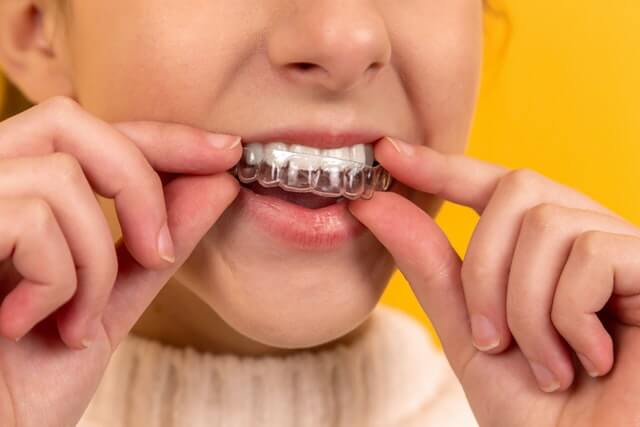Dentist for Teeth Grinding
Are you looking for a “dentist for teeth grinding near me”? If you have frequent headaches and sore teeth, these can be signs of teeth grinding and jaw clenching. Read on to know more about this condition and the ways you can protect your teeth.

What is teeth grinding?
The medical term for teeth grinding is Bruxism. Simply put, it’s a condition where people unconsciously grind or clench their teeth to the point that it becomes a problem. It can happen while one is awake (Awake Bruxism) or when one is asleep (Sleep Bruxism). Unconscious or excessive grinding of your teeth can be a problem. If left untreated, it can cause worn teeth, pain in your jaw muscles, and in your temporomandibular joint. In severe cases, it can cause damage to your teeth, cause temporomandibular disorder, and tooth loss. It can even cause long-term changes in how you look.
What are the common symptoms of teeth grinding?
Here are the most common symptoms of teeth grinding that you should watch out for:
- Neck pain
- Jaw pain
Locked jaw
Shoulder pain
Headaches
Getting poor quality of sleep
Loose teeth or worn teeth
Tooth pain or tooth sensitivity
Damage to your past dental work
If you suspect that you or your loved one has teeth grinding symptoms above, Dr. Avi Israeli of Sage Dental and Spa can perform an examination of your mouth and jaw. New patient? Call our dental office for your appointment preferences.
Call Now to learn more about our dental services!
What causes teeth grinding?
It’s unclear to pinpoint a specific reason why people unconsciously grind their teeth. Rather, there are many risk factors that can contribute to it. Grinding your teeth while awake is usually linked to emotional issues or psychological problems like anxiety. People who are under a lot of stress, and who are feeling anxious, or angry tend to clench or grind their teeth more. Some people grind their teeth for no reason, and they may do it unknowingly or out of habit.
On the other hand, teeth grinding while asleep is associated with certain sleep disorders such as sleep apnea. This is a more serious case since you wouldn’t know right away if you have this condition and you might not seek the help that you need. Some prescription medications used to treat depression and anxiety, as well as caffeine, tobacco, and drug use may also cause the grinding.
What is the treatment for the grinding?
It is important to note that in most cases, people who grind their teeth don’t even need professional treatment to stop their habit. But if it becomes a problem, there are several ways to prevent teeth grinding. Knowing its cause will help you determine which treatment will be best for you.
The treatment options include:
Using a night guard – it can be hard to notice when it happens while you are asleep and unconscious, but one way to protect your teeth from damage is to use a night guard. This can be designed for your upper teeth or lower teeth. Scheduling an appointment and talking with your dentist is the best place to get a night guard. Your dentist will be able to create one that is custom-fit and will protect your teeth and bite. A custom night guard is recommended over having a one-size-fits-all because it will be more comfortable to use, will not irritate your tooth enamel, and will not cause any shift in your bite in the long term. Wearing one can help prevent TMJ problems and TMJ disorder.
Seeking the right professional help – Are you under extreme stress? Are you feeling anxious or angry all the time? Do you find it hard to control your emotions that contribute to your teeth grinding? Consider seeking help through stress counseling. Your dentist may recommend you to a licensed therapist. Doctors also use biofeedback where they are able to monitor your muscle tension and use physical therapy stretching exercises in your jaw and neck areas. If it is caused by sleep disorders, a sleep specialist can also evaluate you better by running some tests.
Taking certain medications – when you are experiencing painful symptoms, anti-inflammatory medications can usually help relieve your pain. Your doctor may recommend you to take medication that will help relieve tensed jaw muscles and stop grinding.
Restorative treatment – lastly, if your chronic bruxism has already caused damaged teeth, don’t be dismayed! Your dentist can recommend a restorative treatment for you. Talk with your dentist about the best procedure and treatment plan for you.
helpful Tips for you to prevent teeth grinding
Since stress can be a major cause of teeth grinding, learning how to manage your stress is one of the best ways in treating it. There are certain practices that you can do on your own that will help you avoid this. For example, you can practice meditation and relaxation techniques. This will help you manage your stress and anxiety better. If you want company, you may enroll yourself in meditation or yoga classes.
At home, reduce and eliminate your stressors away from your bedroom. If you are working from home, avoid doing your work in your bedroom. Many patients also listen to relaxing music or use aromatherapy when they go to bed to help them sleep better. Practice good sleep habits. You can go to bed at a set time, avoid the use of gadgets before going to bed, and close the blinds to make your room more conducive to sleep.
Another way to help prevent teeth grinding on your own is to do regular jaw joint stretches to help relax your jaw muscles.
Your diet also plays a role, so you may want to cut back on alcohol, tobacco, or caffeine to help you reduce stress. If you have a spouse or a partner, you can ask for their help to observe any symptoms of teeth grinding that you might have during the night. This way, you will be made aware of any symptoms even while asleep and you can report to your doctor as needed.
Frequently Asked Questions
How common is teeth grinding?
This condition affects ten percent of adults in the United States.
I will be a new patient. What can I expect on my first visit?
Expect your dentist to conduct an examination of your mouth during your first visit. This will also be a good time to discuss with your dentist any painful symptoms you are experiencing, such as jaw pain and facial pain. Your dentist might ask you how long you are experiencing the symptoms, and how severe they are.
It’s good to inform him about your medical history that may be relevant to your condition and any medications that you are currently taking. Your dentist will also ask important details that may contribute to your condition, such as your diet and any major life changes.
Can my child also suffer from teeth grinding?
Teeth grinding is, in fact, believed to be more common in young children than in adults. This does not usually cause any harm because children’s teeth are still temporary and children outgrow their grinding over the years. If you think your child grinds his teeth, you can help him relax before going to bed, and ask if there is anything that is making him upset.
How can teeth grinding cause tinnitus?
Tinnitus is a condition where a person can hear a constant ringing in the ears. This can happen when the temporomandibular joint is damaged. Teeth grinding can cause injury to the temporomandibular joints, so it is possible for it to cause tinnitus.
YOUR DENTIST FOR TEETH GRINDING
Our dental team, headed by Dr. Avi Israeli at Sage Dental and Spa Wall Township has several treatments that can relieve pain and prevent the long-term loss of a tooth. Get in touch to learn more about how our dental office can help you.

